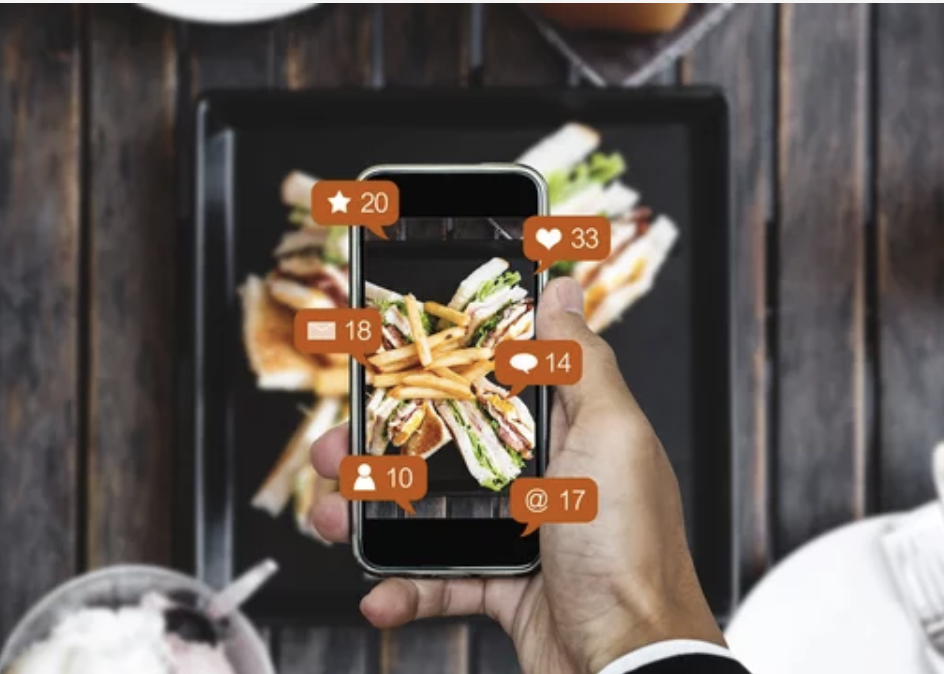
Our connection with food is like a complicated dance, intricately woven into the fabric of our lives. Recent research takes us on a journey through the intricate interplay between our brains, those irresistible foods, and their sneaky addictive nature. Additionally, fasting, once primarily associated with religious practices, is now gaining recognition for its potential benefits in resetting the body’s cellular processes and preventing diseases, including cancer. Yaah! has coined the term “social food addiction” to explore the psychological underpinnings and the complex interplay between our brains, food, and addictive behaviors on social media.
Food on the Brain
According to Professor Bartley Hoebel, a psychologist at Princeton University in New Jersey,
“Highly palatable foods and highly potent sexual stimuli are the only stimuli capable of activating the dopamine system with anywhere near the potency of addictive drugs.”
They give addictive drugs a run for their money! Imagine, your favorite fatty and sugary delights might be pulling the same tricks as nicotine and heroin. Shocking, right? Chocolate, cheese, and red meat, especially when they team up with sugar, are the villains here. They release natural opioids in your brain, creating a drug-like effect.
For example, chocolate contains mild cannabinoids and amphetamine-like compounds, while cheese has casein, metabolized into opiates or casomorphins.
Cheese contains high levels of casein, a protein that breaks apart during digestion to produce morphine-like opiate compounds, called casomorphins. These opiates are believed to be responsible for the mother-infant bond that occurs during nursing. It’s no surprise many of us feel bonded to the refrigerator.
The brain, designed to reward behaviors promoting survival, releases dopamine even at the sight of favorite, fat-laden foods, contributing to the concept of “comfort foods” that calm the brain by lowering stress hormone levels. Our brains, wired to reward behaviors that keep us alive, release dopamine just by laying eyes on our favorite, fat-loaded foods. It’s like a little party in our brains every time we spot those comfort foods, calming our stress hormones.
Stress hormones mess with the reward system, making us want more without necessarily increasing our enjoyment. Studies even hint that exposure to fatty foods can rewire our hormonal system, setting us up for a cycle of unstoppable cravings. Stress magnifies the desire for such foods, triggering binge eating and compulsive behaviors, creating a cycle of increased cravings.

The Recipe for Addiction
Scientists are uncovering the biological effects of certain foods, suggesting that overconsumption might induce changes in the brain and body, may lead to withdrawal symptoms similar to those seen in nicotine or morphine withdrawal in humans. This hints at the possibility of some individuals becoming overly dependent on sweet foods, with the brain exhibiting addiction-like responses and triggering physiological changes that mute the hormonal signals that normally tell you to put down the fork. This serves as a profound gateway to understanding the psychology of food.
- Certain foods that can become addictive:
- chocolate, cheese, red meat practically anything combining sugar and fat
- These foods cause the brain to release its own natural opioids in the brain‘s pleasure centers and contain drug-like molecules:
- Chocolate (i.e. mild cannabinoids, amphetamine-like compounds).
- Cheese (casein metabolised into opiates/casomorphins).
- Brain is designed to reward eating and other behaviors that promote survival.
- Fat and sugar also calm the brain, lowering levels of stress hormones “comfort foods”
- “Stress magnifies the wanting”
- STRESS can trigger binge eating.
- Stress hormones change the value of reward increasing desire without actually increasing enjoyment.
Sarah Leibowitz, a neurobiologist at Rockefeller University in New York City, experiments show that exposure to fatty foods may quickly reconfigure the body’s hormonal system to want yet more fat. Combined with Hoebel’s research reveals that highly palatable foods, coupled with highly potent stimuli, activate the dopamine system with a potency comparable to addictive drugs like nicotine and heroin. The visual allure of these addictive foods intensifies when scrolling various social media platforms causing social food addiction.
Social Food Addiction and Food Porn
The virtual world, especially Instagram, is like the Las Vegas of culinary experiences. Scrolling through meticulously crafted images of decadent desserts and savory feasts is our guilty pleasure. The term “food porn” perfectly captures this visual feast that triggers a dopamine release, creating a neurobiological response that’s not limited to just eating the food but extends to the mere act of drooling over those tempting images on our screens.
The phrase “food porn” encapsulates the phenomenon of visually stimulating food content that elicits an almost primal desire. Studies suggest that merely gazing at favorite, fat-laden foods can set off a chemical cascade in the brain, releasing dopamine—the neurotransmitter associated with pleasure and reward. This neurobiological response isn’t limited to the act of consuming the food itself; it extends to the mere act of visually consuming these tempting images on our screens.

The constant availability of these visual delights can stress us out, pushing us into impulsive binge-eating episodes. The dangers lie not just in the temptation to overindulge, but in the potential impact on mental health. As we mindlessly scroll through these curated feeds,
the brain’s reward system goes into overdrive. Stress, magnified by the desire for these indulgent treats, can lead to impulsive binge-eating episodes, a phenomenon exacerbated by the constant availability of these visuals.
While the dopamine-driven allure of food porn is undeniable, cultivating a healthy relationship with our digital dining experiences is key to preserving both our physical and mental well-being in the era of online indulgence.
The Detox from Social Food Addiction
Detoxifying from such addictive substances poses challenges. New and potentially explosive findings on the biological effects of certain foods combined with the influx of social media temptations suggest that eating yourself into obesity isn’t simply down to a lack of self-control. Some scientists are starting to believe that bingeing on foods (both physical and visually) can cause changes to your brain and body that make it hard to say no.
The Digital Detox: To stop social food addiction, the first step is to stop feasting with our eyes. Consider a social media detox as a digital cleanse for your well-being. Just as you might cut out certain foods for a physical detox, curating your online world can be a powerful step towards preventing triggers uncontrollable cravings. Instead, opt for content that promotes a balanced, mindful approach to food.
The 12-hour fast, rooted in Ayurveda, aligns with the body’s natural rhythms, supporting metabolism, preventing the accumulation of toxins, normalizing weight, and addressing imbalances associated with specific seasons. This form of intermittent fasting allows the body to concentrate on mental, emotional, and cellular cleansing during the night.
The 7-Day Fast: Extending the discussion to longer fasting periods, such as a 7-day water-only fast, introduces the concept of cellular regeneration and its potential role in cancer prevention. Research by Dr. Thomas Seyfried indicates that fasting may target inflammation contributing to tumor growth. Fasting induces processes like autophagy and apoptosis, essential for cleansing and renewing cellular components, potentially reducing the risk of cancer development.
The intricate relationship between psychology, food, and social media unveils the impact of our dietary choices on both the brain and the body. While addictive tendencies toward certain foods are rooted in neurobiological processes, fasting emerges as a powerful tool to reset cellular mechanisms and potentially prevent diseases like cancer. As we navigate the complexities of our food-driven behaviors, understanding the psychological and physiological aspects of social food addiction becomes crucial in fostering a healthier relationship with what we eat. Create a mindful space where social media inspires rather than dictates. Engage with content that encourages healthy eating habits, explores creative recipes, and educates on nutritional well-being.
Leave a Reply